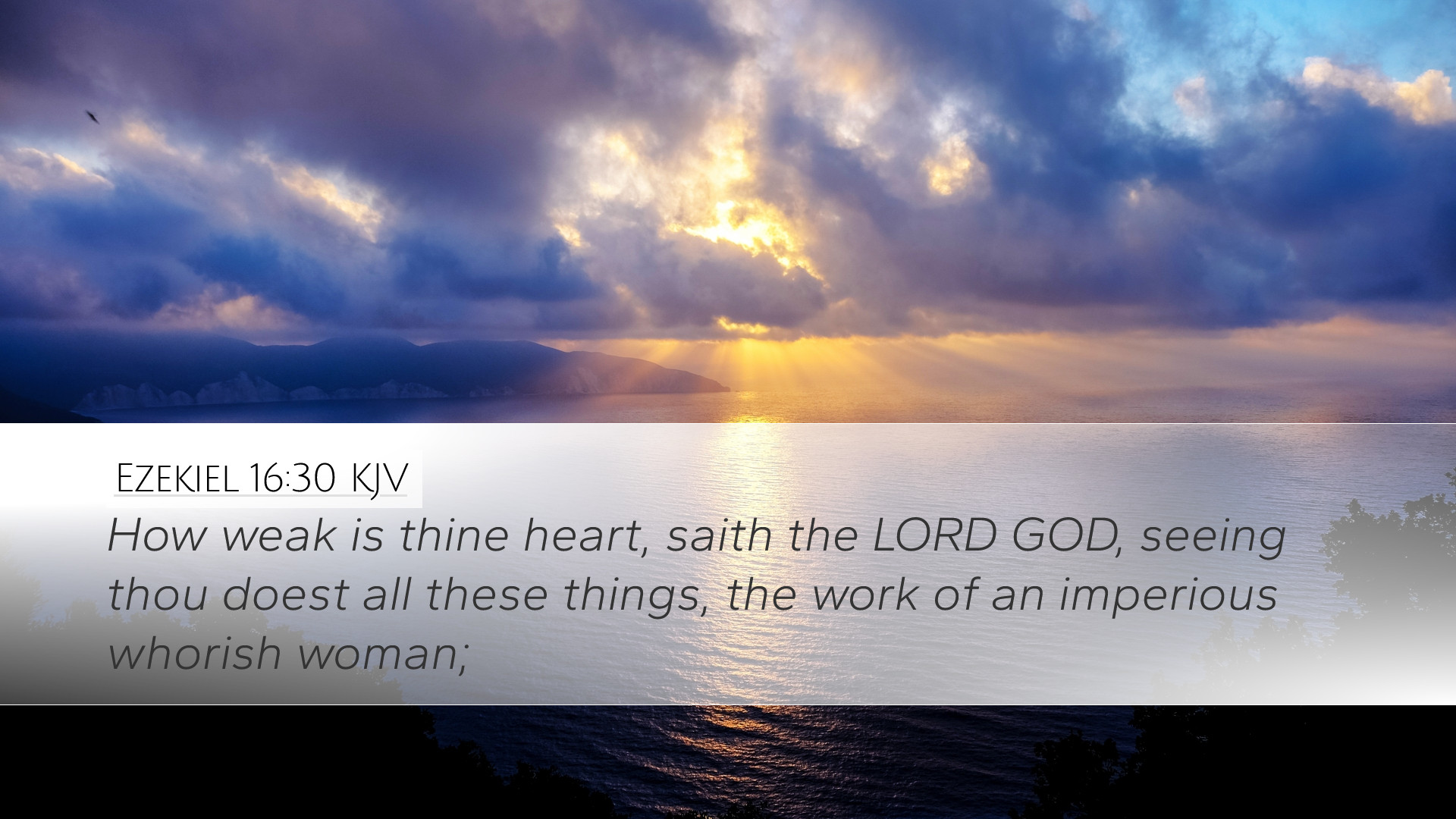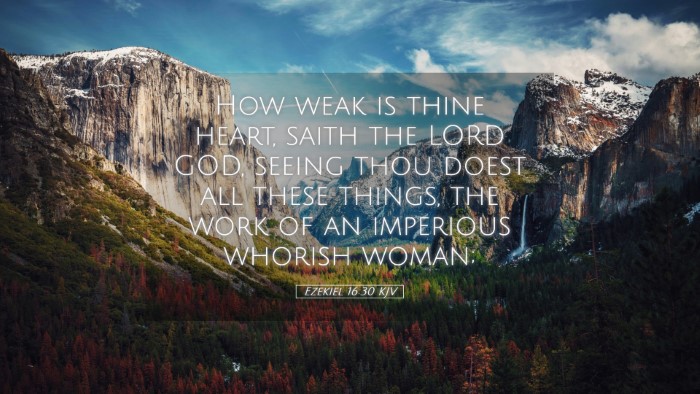Bible Commentary on Ezekiel 16:30
Verse Reference: Ezekiel 16:30 - "How weak is your heart, saith the Lord God, seeing thou dost all these things, the work of an imperious whoredom."
Introduction
The Book of Ezekiel presents profound theological reflections on the nature of sin and the spiritual condition of Israel. In Ezekiel 16, the prophet uses vivid imagery to communicate God's deep grievances against Jerusalem represented as an unfaithful spouse. Ezekiel 16:30 serves as a pivotal verse where God directly addresses the heart of the issue, urging reflection upon the spiritual state of Israel.
Summary of the Commentaries
This commentary synthesizes insights from public domain sources, enriching our understanding of Ezekiel 16:30.
Matthew Henry
Matthew Henry emphasizes the metaphorical language used in the verse, interpreting "whoredom" as an allegorical representation of Israel's infidelity to God through idolatry and disobedience. He points out the significance of the word "weak," suggesting a lamentation over Israel's profound moral decay and spiritual blindness. Henry interprets this as a poignant lesson about the heart's condition, reflecting on how the propensity for sin leads to distance from divine righteousness.
Albert Barnes
Albert Barnes further expounds on the emotion conveyed in the verse. He remarks on the "imperious whoredom"—the arrogance with which Israel pursued idolatry. Barnes highlights this behavior as an affront to God's covenant and love. He notes that the Lord’s inquiry about the weakness of the heart directs our attention to the root of moral failure: a heart not aligned with God's will. These reflections draw attention to the need for self-examination and the importance of a steadfast heart in alignment with divine truth.
Adam Clarke
Adam Clarke provides an in-depth analysis of the term "whoredom," detailing the cultural and historical context of Israel's idolatrous practices. He connects this to the spiritual harlotry described throughout the prophetic texts. Clarke mentions that God's question, "How weak is your heart," illustrates His compassion mixed with righteous indignation. He invites readers to consider the implications of spiritual infidelity, warning that a heart given to idols becomes desensitized to God's voice. Clarke calls for a restoration towards faithfulness and spiritual purity.
Theological Implications
Ezekiel 16:30 encapsulates critical theological themes relevant to pastors and scholars. The issue of a 'weak heart' points towards a lack of spiritual resolve and commitment, leading to the serious consequences of sin. It serves as a reminder that the state of one's heart directly influences their relationship with God. The image of whoredom is potent within biblical literature, representing the gravity of breaking covenant with the Lord. The verse urges a contemplation of our spiritual fidelity in light of Christ's sacrificial love.
Spiritual Decline and Restoration
The commentary on this verse also speaks to the broader narrative of decline and the hope for restoration throughout the Scriptures. While Israel's unfaithfulness is chronicled, the invitation to return to orthodox practices and faithfulness cannot be understated. Pastors and teachers may draw on this text in teaching about the restoration that God offers, not only to Israel but to all believers who stray from His heart.
Applications for Today
The contemporary application of Ezekiel 16:30 is profound. It prompts self-assessment regarding our engagements with modern idols—be they materialism, secularism, or personal ambitions. In a world where competing commitments claim our focus, this text serves as a clarion call to engage our 'hearts' fully with God. The weakness of heart becomes a challenge not only for individuals but also for communities of faith, calling them to reflect God's love and faithfulness in tangible ways.
Conclusion
The insights from Matthew Henry, Albert Barnes, and Adam Clarke provide valuable perspectives on Ezekiel 16:30, urging serious contemplation of the text's implications. This verse is not merely historical but enlivens the ongoing discourse on faithfulness and the human condition before a righteous God. As stewards of biblical truth, pastors and theologians are invited to embrace this message not only for personal reflection but as a transformative call to communal faithfulness.


